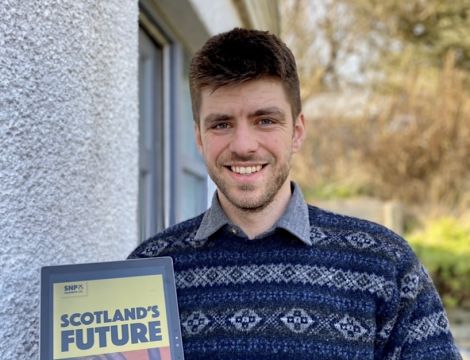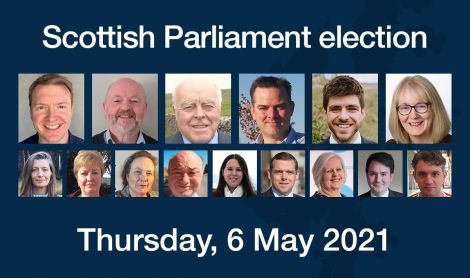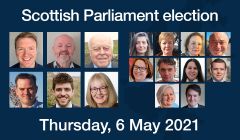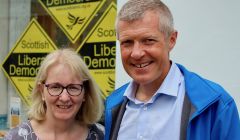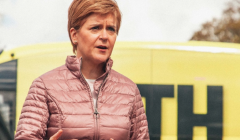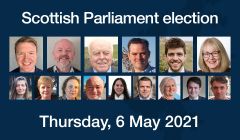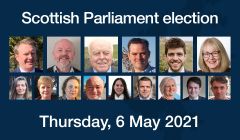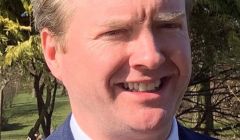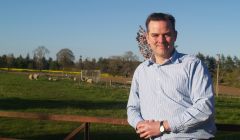Election / Independence not top of his priorities due to Covid recovery, says SNP candidate Wills
Shetland News is publishing profiles of all six candidates contesting the Shetland constituency seat in the 6 May election to the Scottish Parliament
“WE’VE GOT new young members who are really active, so it feels very different this time around,” says second-time SNP candidate Tom Wills when asked to assess the party’s chances of ending a Liberal hegemony that has lasted since the Scottish Parliament’s foundation.
In the August 2019 by-election to replace Liberal Democrat MSP Tavish Scott, who had held the Shetland seat for 20 years, Wills came a creditable second with 32 per cent of the vote. But to go one better this time around requires overturning a margin of nearly 2,000 votes that separated him and Scott’s successor Beatrice Wishart.
Wills has worked in renewables for 12 years – the last three on tidal turbines in Bluemull Sound – and sees that industry as a major pillar of Shetland’s economic future.
While he “wasn’t planning to get into politics” when he moved home with his young family, after running in the by-election he used the ensuing 18 months “to think about what I would do if elected”.
Most of the intervening 18 months have been dominated by Covid-19, but has anything changed to give Wills real hope of winning the seat this time?
“The promises of Brexit were hollow, and also I think people have seen how well Nicola Sturgeon has handled the pandemic,” he says.
“Thirdly the fact that I’m standing for a second time, with a really detailed set of policy priorities that are specific to Shetland, and the fact we’ve had this influx of new, young local members is all working in our favour. But there’s obviously no room for complacency.”
Wills refers to this election as “our best ever chance at it” and points to a by-election turnout of only 50 per cent in Lerwick, saying “we’ll only get it if everyone who is supportive turns out to vote”.
Become a member of Shetland News
“In the last few days, I have spoken to several lifelong Lib Dems who didn’t vote for the SNP in the last election but will be for the first time in this election,” he continues.
His vision for Shetland centres on a Scandinavian model (he studied marine engineering in Norway) of high quality public services, maximising the benefits of renewables, investment in improving mental health, greater local say over resources including the waters around the islands, tackling poverty and building a fairer, more equal society.
He and his party, of course, want that society to form part of an independent Scotland. Wills has been accused by anti-EU, pro-independence candidate Brian Nugent of skirting around the SNP’s plans to stage a second referendum within the next parliament, with the focus of his election literature focusing on other issues.
“There is no trick here,” he responds. “The priorities on my leaflets are my priorities. I’ve spent a lot of time thinking about what I can get done for Shetland if I’m elected [next] Thursday, and the work would begin on Friday.
“Independence would not be top of my priorities. Everyone knows the SNP supports independence, but my priorities are Shetland priorities.”
Looking at the level of support for independence among younger generations “it’s clear to my mind that it’s coming anyway”, but the next parliament will initially focus on emerging from the Covid-19 pandemic.
Wills believes voters should be reassured that some who “would take a less careful approach” to the constitutional issue ‘have felt the need to leave the SNP and join the likes of Restore Scotland or Alba”.
The status quo is not an option, he argues: “Even if you want things to stay the same, things are going to have to change because we’re being dragged in an extreme right-wing direction”.
Please read our other candidate profiles here:
4 May – Independent candidate Peter Tait wants ‘greater emphasis on moral values’
25 April – Labour offers a’genuine and fair recovery for all’, election candidate Kerr says
22 April – ‘We need to stop being backward looking’, Conservative candidate Nick Tulloch insists
17 April – ‘Punching above their weight’ – Lib Dem Wishart vows to continue speaking up for islanders
15 April – Nugent hopeful party’s ‘unique selling point’ will resonate with voters
Newspaper front pages this week have been dominated by prime minister Boris Johnson’s conduct on multiple fronts, and Wills is exasperated at suggestions from political opponents that the SNP is equally lacking in integrity.
“There’s an absolute avalanche of sleaze and corruption being revealed at Westminster,” he tells Shetland News.
He refers to “contracts being awarded to school friends of Boris Johnson and Matt Hancock”, and dismisses attempts by others to draw parallels with a breakdown in trust of politicians – specifically those in the SNP government – at Holyrood.
Labour candidate Martin Kerr, for instance, referred to it being “hardest to look in your own back yard as opposed to across the fence”.
The SNP’s reputation undoubtedly took a dent over its mishandling of complaints about Alex Salmond, but Wills says the Shetland branch was signing up new members even as Sturgeon gave evidence to a parliamentary committee in February.
“To my mind that’s a marker that most people realised she does have trust and integrity, and while the HR procedures (were not followed) within the Scottish Government, that’s a different order of magnitude of a transgression in public life than is awarding billions of pounds of contracts to your mates. Forgetting a meeting is not the same as consistently lying.”
There is broad consensus that Sturgeon has communicated well throughout the pandemic, but some point out that Scotland’s health and economic outcomes have not always been better than the rest of the UK.
Wills says there have been “substantive differences” and argues that “moral leadership and communication” supplied by the first minister has helped cultivate the “high levels of public trust in institutions” required to deliver a “coherent and effective response to coronavirus”.
Several weeks of delay in confirming what level of restrictions would apply here from 26 April caused frustration locally following a consultation on whether islanders wished to accept greater freedoms in exchange for travel restrictions.
Wills says he sympathises with all businesses affected by the pandemic, but points to international examples as a reminder of why proceeding with public health-focused caution remains crucial.
“I think we’re all deeply frustrated at having our liberties restricted, but these decisions have to be based on the science. We’re such a small population that… it only takes a handful of cases to change what level we’d be in locally.”
Centralisation
There has long been wider frustration at a lack of decision-making powers being handed down to island communities.
Wills acknowledges the centralisation charge frequently levelled at the SNP and, while disputing the extent to which that holds true, has been quick during this campaign to voice objection to things like HIAL’s plan to centralise air traffic control to Inverness.
Local government “needs more powers”, but he contends that the Islands Act has yet to be used to its full potential: “It provides a mechanism for local authorities to ask for specific powers to be devolved. The SIC is looking into options but has yet to make any requests. I’ve proposed we should start with some of the things that are most important – local waters, transport, potentially energy as well.”
He wants to see the community and government working together on “some kind of joint venture” to ensure fixed link tunnels connecting the likes of Unst, Whalsay and Yell to the Shetland mainland become a reality.
Again Wills refers to the positive example of Nordic countries which “put public infrastructure and services first” rather than examples like the US and to a lesser extent the UK where “this extreme right wing approach leads to public infrastructure crumbling apart”.
While many will be sceptical about the viability of his pledge during last week’s BBC election hustings to resist accepting the rules of the hated Common Fisheries Policy were an independent Scotland to rejoin the EU, Wills is clear that in a global economy no nation can afford to be inward looking.
“As a species we need more internationalism and more international cooperation. Brexit has shown there is no such thing as absolute sovereignty today.
“We live in an interconnected, interdependent world… for the next generation of Shetlanders [that] means living in a healthy modern democracy on a planet with a stable climate.
“That’s why the SNP does seek a closer relationship with Europe than do the Tories. If we prioritise our national industries, like fishing, having a civilised relationship with our European neighbours can be a positive thing.”
The Scottish Parliament elections take place on 6 May. There are six candidates contesting the Shetland seat. They are in alphabetical order: Martin Kerr (Labour), Brian Nugent (Restore Scotland); Peter Tait (Independent), Nick Tulloch (Conservatives), Tom Wills (SNP) and Beatrice Wishart (Liberal Democrats).
To find out more about all the candidates standing in the election, including those on the regional Highlands and Islands list, visit our Scottish Parliament election 2021 page below.
Become a member of Shetland News
Shetland News is asking its many readers to consider paying for membership to get additional features and services: -
- Remove non-local ads;
- Bookmark posts to read later;
- Exclusive curated weekly newsletter;
- Hide membership messages;
- Comments open for discussion.
If you appreciate what we do and feel strongly about impartial local journalism, then please become a member of Shetland News by either making a single payment, or setting up a monthly, quarterly or yearly subscription.






